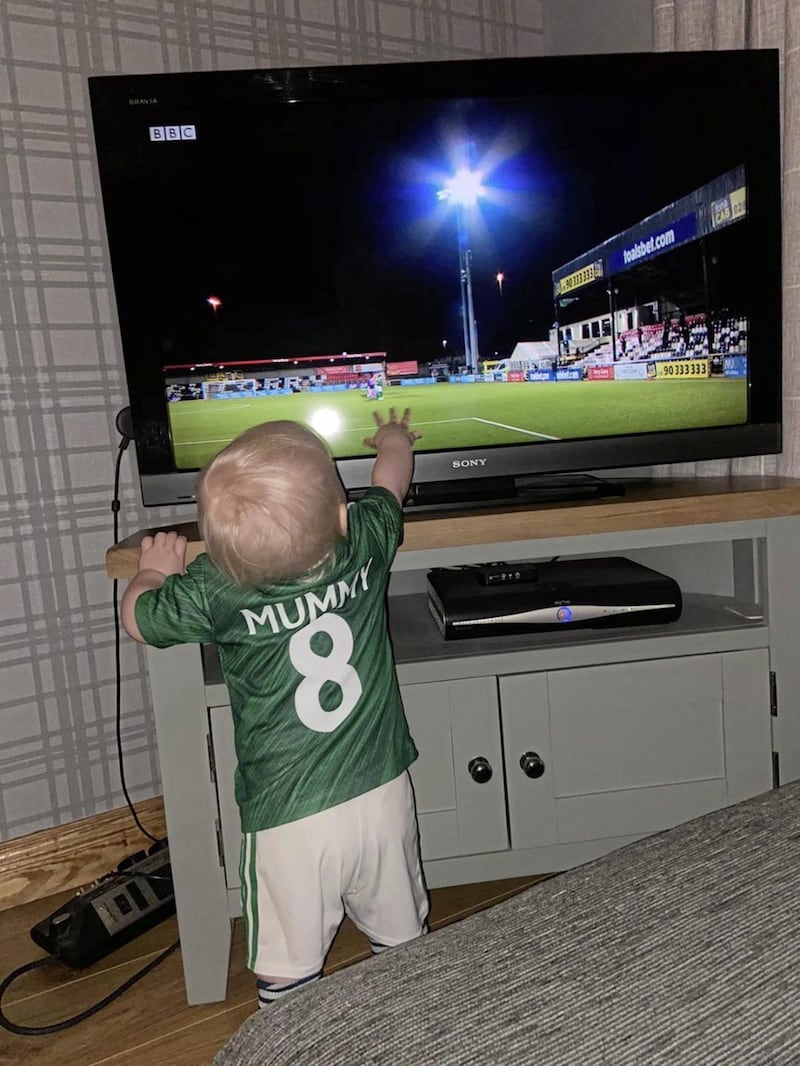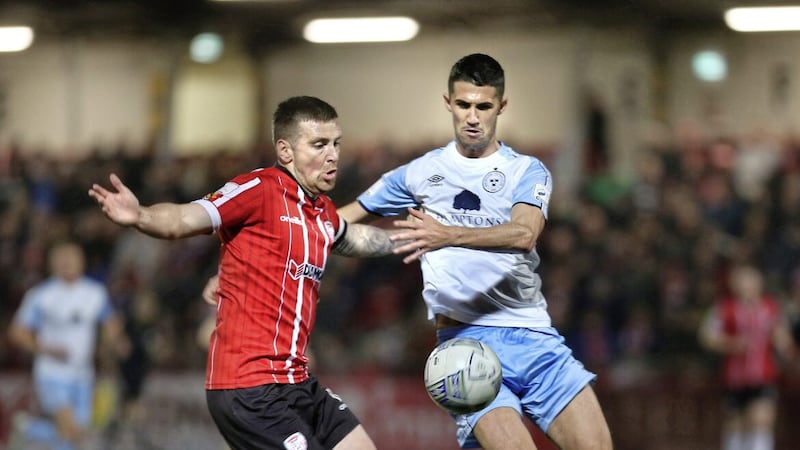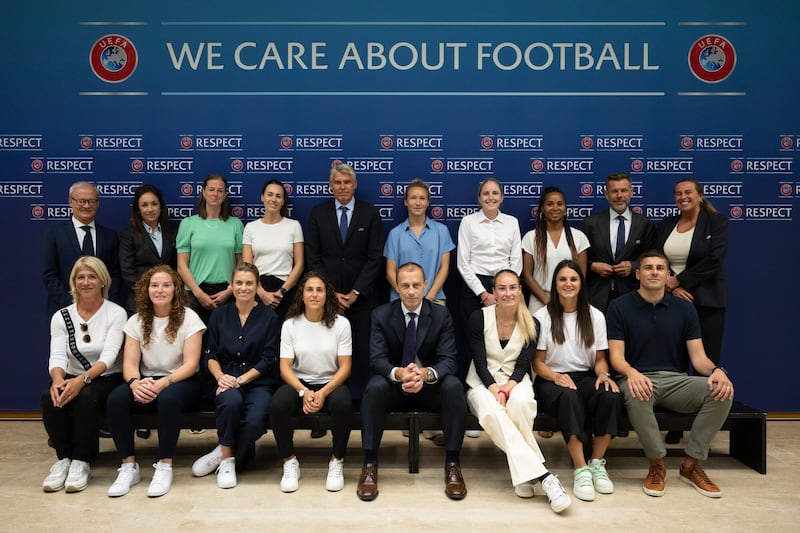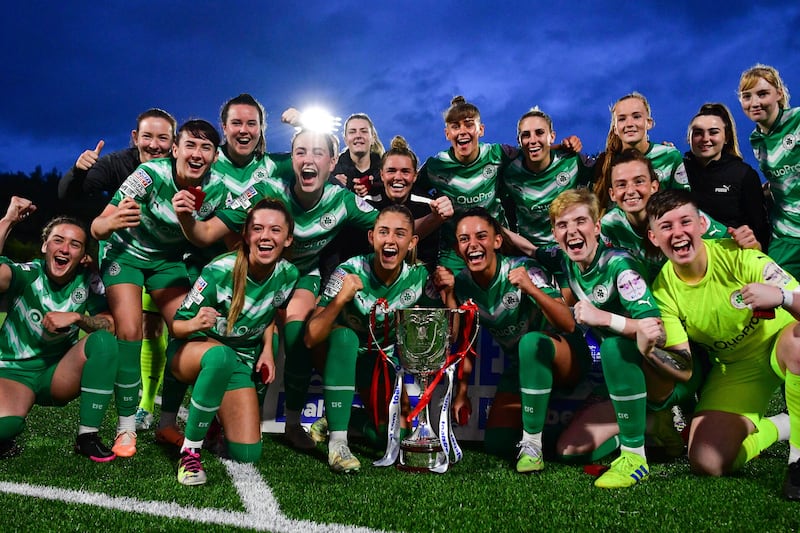MARISSA Callaghan stands on the front steps of St Peter’s Cathedral, her arms poker straight and digging as deep as they can into her coat pockets. It's just gone 3pm. She's early.
For a bright Saturday afternoon in March there are few people around this Lower Falls Road neighbourhood.
The whirring sound of an ice-cream van echoes all around these tiny, compact streets – each row of houses like capillaries leading to the Cathedral’s twin spires.
These streets, where she played football endlessly, moulded the Northern Ireland women’s captain now bound for this summer’s European Championships in England.
The long-serving Cliftonville player was probably the last of the street footballer generation, before Xboxes invaded and killed off the playful screams of children and dull thud of footballs off gable walls.
Twins Jeanie and Roseanne McConville, Joanne Benson, Donna McCann and Marissa were thick as thieves.
Behind the Cathedral, Marissa stops.
“See that lamppost, that was our net. The lamppost was the goalpost and we used to paint the other post over here.”
Grappling with her bearings, she confirms: “The painted post was there. We used to play knock-outs, headers-and-volleys every day and this is where we had our matches. We played Rounders, we played ‘Cribby’… There were loads of us all the same age.
“We had the neighbours tortured. We never played in the grounds of the chapel, probably out of respect…
“They used to have loads of priests in there. I was running up to the shop one day and I remember one of the priests stopping me and saying: ‘You’re going to be in the Olympics someday.’
“That always stuck in my head.”
Her Granny Maggie, who was always poorly due to a number of strokes when Marissa was little, would say: ‘Our Marissa’s going to be on stage’.
To this day, she carries her granny’s Hail Mary statue in her kitbag for every Northern Ireland match.
There was an indefinable, romantic fate surrounding this young, sports-mad kid from Divis with the unruly curls and feet of an angel who never slept before her sports day at St Peter’s Primary School.
“One of my class-mates, Paula O’Neill, was quite sporty when she was younger. When we were P7 they added a penalty shoot-out competition into the sports day and Paula beat me in the final of it.”
At a parent-teachers meeting, Miss Thompson told Marissa’s parents: ‘You know, your daughter is a very special talent.’
The original family home was a first floor flat on the corner of Albert Terrace that has since been replaced by houses.
Her mother and father still live close by from where they raised their four children.
Staring upwards, she says: “This is where our flat was, right there. We were on the first floor. You had your upstairs and stuff. It was like a house on top of a house. I have great memories there…
“You literally don’t see any kids out playing now, whereas we were out every single day until it was dark.”
The sun beats down on the waste ground between the Cathedral and her old primary school.
This is where it all began for the 36-year-old Northern Ireland international who has already become an icon, a reference point to so many aspiring young female footballers across the north.
From the Falls Road to the European Championships, you realise when you walk through these streets just how remarkable and life-affirming Marissa Callaghan’s journey is.
Currently in full-time training for the Euros and this month’s World Cup Qualifiers against Austria and England, she has one of those pinch-yourself moments.
“It is absolutely crazy to think we are going to the Euros. Like, I had to pay for my gear last year – we paid to play. And we’re now going to the European Championships, which is the top 16 teams in European football, and we’re in it! It’s incredible.”
********************
IN her early teens, Marissa, the twins, Joanne and Donna used to enter five-a-side competitions against boys’ teams at the old Maysfield Leisure Centre. They got hammered most weeks but it didn’t put them off.
Through Martin Foyle, a local community worker, they went across town to play for Newington who had a senior girls' team.
A few years later, the club merged with Cliftonville which was the start of an unending love affair with the Solitude club. Marissa’s technical ability stood out like a sore thumb and she was soon tearing it up for Northern Ireland’s underage teams.
“Then you discover drink,” she says with a wry smile, sitting on benches outside the Laurel Leaf pub on the Falls Road.
“I used to love who I was when I was drinking because you become so confident and meeting new people.
“The local bar was Caffrey’s and I remember going to a friend’s 18th birthday party and that was one of the first times I went out as a teenager. I was maybe 17.”
Growing up, she was crippled with shyness to the point where she would blush if she bumped into a stranger in a shop.
“I remember in St Louise's school the English teacher would point out for someone to read and I remember I was shaking from head to toe and my voice was going. My whole face would have gone red and I think that impacted on me loads in that adolescent stage.”
At 18, she accepted a football scholarship in Alabama, America where she stayed for two years, but for most of that time she suffered terrible homesickness.
When she came back home she’d fallen out of love with football – but still had a passion for coaching the game to kids and would sign up for countless Irish FA courses, whom she's now employed as a Girls Participation Officer.
Around the age of 15 or 16 Marissa realised she was gay and with all the psychological upheaval that brings.
“My friend Roseanne and I kind of explored it with me. We would go up to Caffrey’s and then we started to go down to the gay scene when the Parliament [Bar] was there. That closed down and the Kremlin was the next place.
“It was always me and her… I have such fond memories of that time because you could’ve gone down there by yourself.
“I suppose everyone was going through the same thing. You knew everyone – it was a community. I had the best years, but at the same time it was tough on my mum for the first couple of years…”
Marissa could have chosen a different path in life if it wasn’t for the guiding hands of two people: Anne Gourley and Alife Wylie.
When she returned from America threatening to never kick a ball again, Anne Gourley, her manager at Cliftonville, berated her and told her to “wise up and get back to training”.
“Anne always kept us on the straight and narrow. I was inspired by Anne Gourley.”
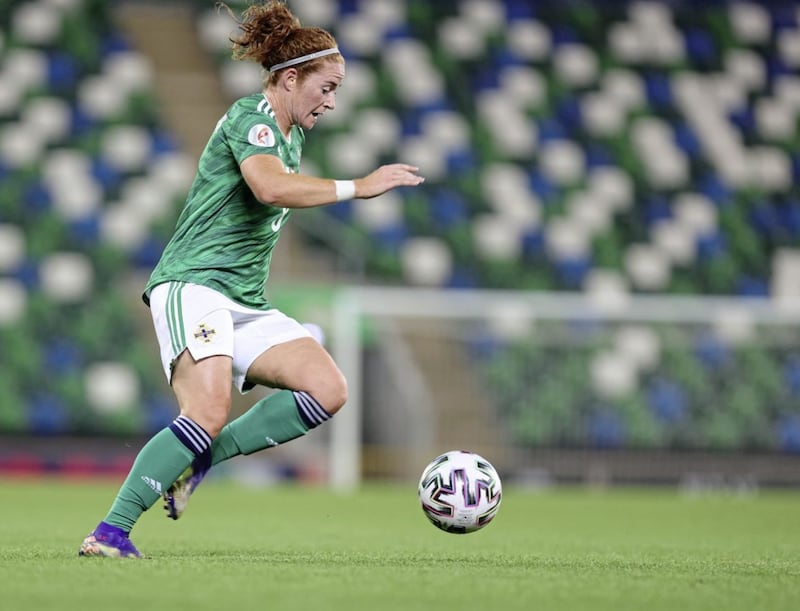
While she continued to play for the Reds, she’d lost all motivation for lining out for Northern Ireland’s new senior team that had been established in 2004.
Countless letters inviting her to trials lay unopened. Marissa was happy to tip along with Cliftonville while pursuing her own coaching career.
At that time, high-regarded IFA coach Alfie Wylie was Northern Ireland women’s football. On every conceivable level.
He was manager, assistant manager, physio, mentor, friend, kit washer, from senior right through the youth ranks – a far cry from the ice baths and foam-rolling sessions at Newforge, where the senior team is currently base.
Wylie didn’t want Marissa to throw away her God-given talent and pestered her at every opportunity to get her back playing for Northern Ireland.
One afternoon he spotted her coming into the old IFA headquarters on the Lisburn Road and called her into his office.
‘Marissa, how old are you now?’
‘Twenty-six.’
‘Why don’t you give us one campaign and if you don’t like it, that’s okay. But give it one shot. It might be your last chance. Think about it. Think about the talent you have and what you're doing with it.’
Wylie recalls the conversation.
“I played on her heart-strings a wee bit,” he says. “I must have asked her a dozen times prior to that with no joy. I didn’t want her leaving the office without getting a commitment from her. I remember feeling great having spoken to her that day and felt she was going to play.”
Marissa says: “Alfie had this big spiel and I remember leaving his office thinking: ‘He’s right. This is my talent. What am I actually doing?’ It was a light-bulb moment. It really was.”
*****************
IN her mid-20s, life was manic – but in a good way. When she wasn’t doing 12-hour shifts in Tony Roma’s or working in Doorsteps, she was training and taking a million training sessions all over the north, trying all the while to instil a passion in young kids for football, and always burning the candle at both ends every weekend.
Her first chance meeting with Paula Reed, now her long-term partner, was at a coaching session at Carmoney Ladies football team.
“Paula was helping out with the youngsters and I was up there coaching at a wee after-schools programme,” Marissa says. “I remember running in late and she was there. Paula always slags me that I was a bit rude – that was our first-ever meeting. I thought she was one of the kids’ parents.”
Not long after that Marissa and Paula met in the Union Street Bar.
“I was going to the toilet and Paula was sitting there with her sister and her friend and we were just chatting. She’d just done the marathon that day and was going to the Grand Canaries for a week.
“The next time was at a Cliftonville Ladies game and she texted me after the game. So we started to text but it was more like a friendship thing.
“We’d go for a coffee or an ice-cream. I’d just broken up with someone so it was something I didn’t know if I wanted to get involved again. So it was really slow. Like, really slow! (laughing)
“And then we eventually had our first date. It was a Bruno Mars concert. My mummy and me were supposed to go but she was sick. So I called Paula to go and that was our first proper date.”
Marissa never imagined becoming a mother but just over two years ago Quinn was born.
“It was all planned. Paula wanted to carry. I can’t say it was something I always wanted to do – carry a baby. But when Paula turned 33 we decided to try IVF and four attempts later…
“Quinn could buy and sell you. He’s just so loveable.”
Within a couple of days of her partner giving birth, Marissa was flying out to Norway to hook up with Kenny Shiels’ Northern Ireland squad.
At the beginning, she admits she wasn’t sure about the new manager’s credentials.
“The first time I met Kenny he was asking me all these questions and I thought: ‘Oh my God, he knows nothing about women’s football.’
“I remember phoning Demi Vance, my room-mate, and I was saying: ‘Demi, I don’t know about him’.”
That early scepticism disappeared after the senior squad’s first training camp up in Greenmount College, Co Antrim, in 2019.
“The first time he had us all in a room he literally had us all wanting to play. He was so inspirational. I had this fire in my belly to work hard.”
With barely no resources being directed into the women’s game in the last decade, Northern Ireland suffered so many heavy defeats.
“We didn’t go out to win games,” Marissa says, “we went out to defend and not concede.”
In the last couple of years so many things began to fall into place. For starters, there was a talented clutch of young players coming through alongside the more experienced members of the squad; the Association began to fund the women’s international teams slightly better than before, and with elite status allowing them to train during the pandemic, the players themselves made tremendous gains and Kenny and son Dean had that great resource of time and space – the envy of every coaching team - to delve into the finer details and make the difference.
In the race for this summer’s European Championships, the north finished second behind Norway in Group Two but could still qualify via the play-offs, albeit against the highly-rated Ukraine.
In April 2021, one of international football’s renowned no-hopers achieved what seemed like the impossible dream: scoring a 4-1 aggregate victory over the Ukrainians to clinch their place in a major tournament for the first time.
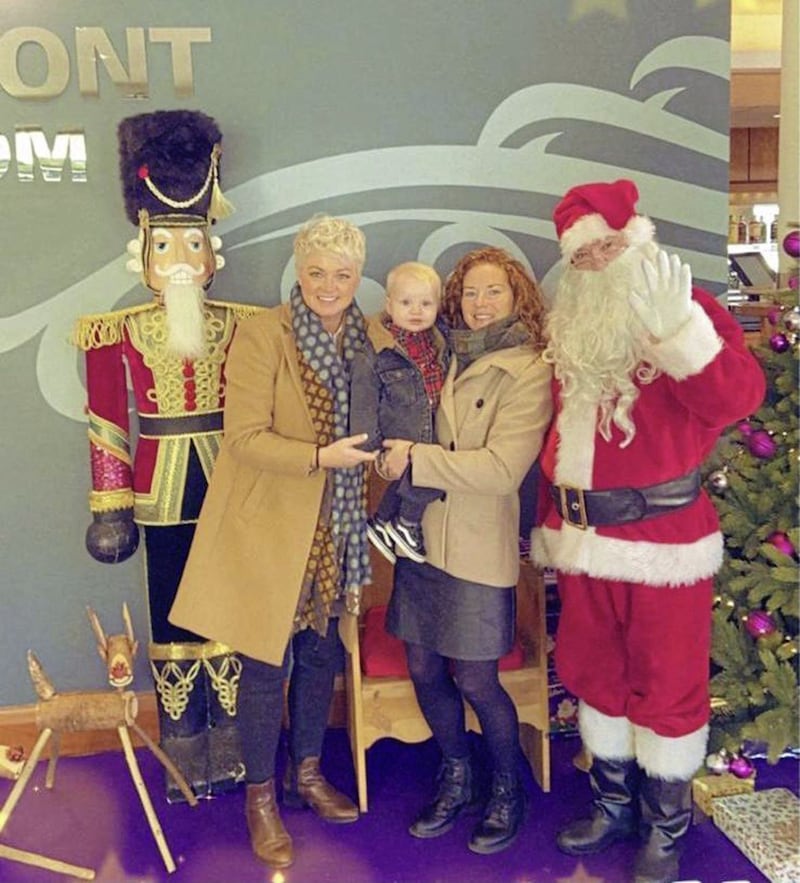
As she looks ahead to what is sure to be an unforgettable summer, Marissa Callaghan has achieved extraordinary things in her life.
Every time there was a fork in the road she always seemed to take the right one. Her parents - Ann Marie and Eugene - helped point the way.
Granny Maggie and her Hail Mary statue, of course.
Her words echoes still: ‘Our Marissa is going to be on stage.’
Rosanne. Jeanie. Donna. Joanne. Marissa. Five sisters who took their beatings in Maysfield and had the courage to come back for more.
Ciaran McConville for teaching her keepy-uppies with both feet. Her aunt Margaret for her first pair of football boots that belonged to her cousin Stephen.
Martin Foyle. Learning the game with all the girls at Newington. Life-long friendships right there.
Louise Irvine, a team-mate and one of her closest friends, for making those awkward teenage years not as bad as they seemed.
The disco balls and blinding lights of the Kremlin on a Saturday night – the sense of community and knowing, deep down, things were going to be okay.
The awesome Anne Gourley and the game-changers at Cliftonville. They know who they are.
The indefatigable Alfie Wylie, the great persuader.
Kenny and Dean for making dreams come true. And how she would lie down and die for her team-mates in green.
Paula, her constant and her "rock". And ah, dear Quinn. For you, a thousand times over.
Always coaching, always cajoling and inspiring the next generation in her own quietly spoken way.
You have worth. You are good. Believe in yourself.
“It’s not just about having talent; it’s everything around that: meeting new friends, being taken out of your comfort zone, it’s the competition – learn how to win, learn how to lose.
“I just find sport gives you so many life lessons without even knowing.
“When we were young playing football we were called ‘Tom Boys’ because we were into sport, whereas now it’s starting to be cool to be an athlete. We want to empower these young girls to be fit and strong. I hope we can keep growing that.
“With us going to the Euros, now the kids can look and say – ‘I want to be a professional footballer’. I didn’t have that as a kid.”
The afternoon sun has slipped away and there’s a chill in the air.
In the perpetual shadow of St Peter’s Cathedral was where Marissa Callaghan made her feet dance.
In truth, the child’s feet never really left there.
“I’m so proud of where I come from and so lucky I had the childhood that I had, and being from the streets of Divis.
“I never wanted for anything. We didn’t have money but we always had the necessities. We were out on the street playing every day. You had no worries. You were a child and that was it.”
